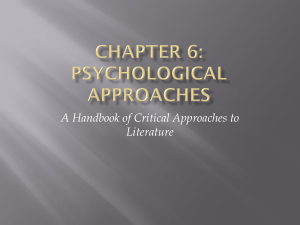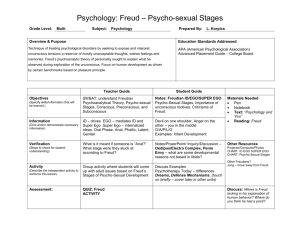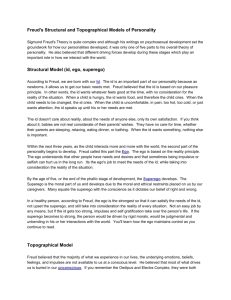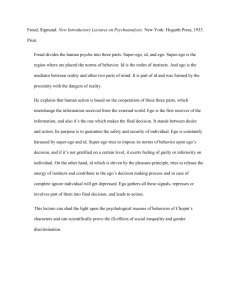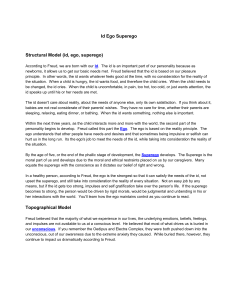Sigmund Freud's Theories: Id, Ego, Super Ego & Psychosexual Stages
advertisement
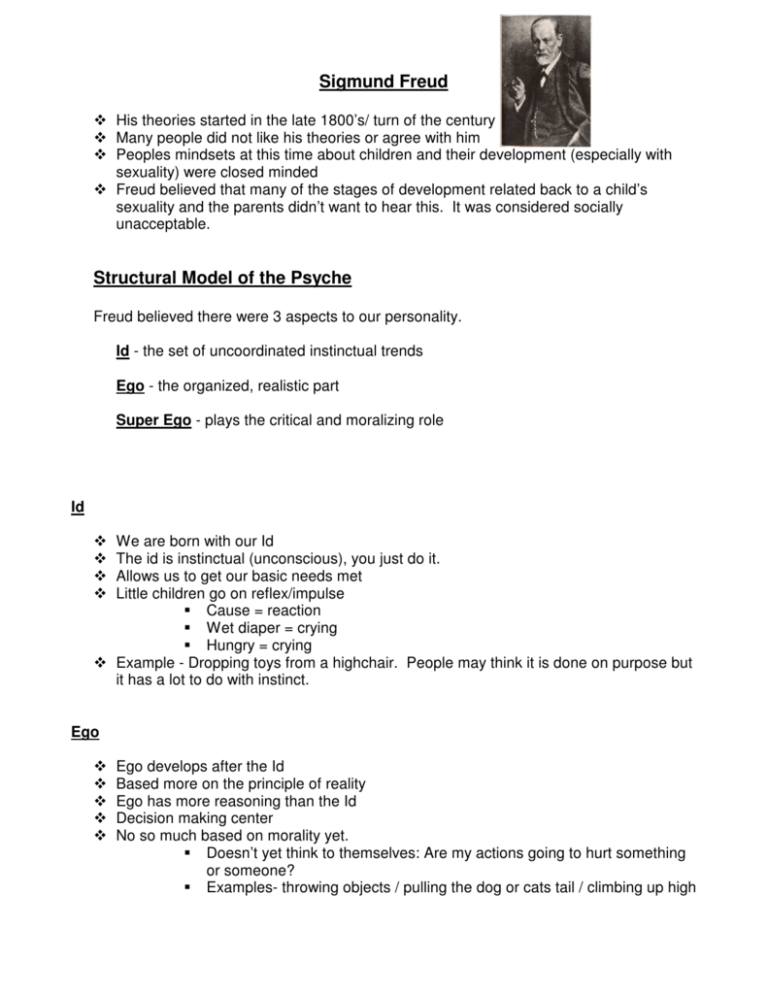
Sigmund Freud His theories started in the late 1800’s/ turn of the century Many people did not like his theories or agree with him Peoples mindsets at this time about children and their development (especially with sexuality) were closed minded Freud believed that many of the stages of development related back to a child’s sexuality and the parents didn’t want to hear this. It was considered socially unacceptable. Structural Model of the Psyche Freud believed there were 3 aspects to our personality. Id - the set of uncoordinated instinctual trends Ego - the organized, realistic part Super Ego - plays the critical and moralizing role Id We are born with our Id The id is instinctual (unconscious), you just do it. Allows us to get our basic needs met Little children go on reflex/impulse Cause = reaction Wet diaper = crying Hungry = crying Example - Dropping toys from a highchair. People may think it is done on purpose but it has a lot to do with instinct. Ego Ego develops after the Id Based more on the principle of reality Ego has more reasoning than the Id Decision making center No so much based on morality yet. Doesn’t yet think to themselves: Are my actions going to hurt something or someone? Examples- throwing objects / pulling the dog or cats tail / climbing up high Super Ego Develops after Ego – usually by age 5 Development of morality We often refer to this as our conscience Aims for perfection Represents our reasoning for doing right from wrong Punishes our bad behaviour with feelings of guilt Decision making Example - Angry at someone Id – wants to hit them – pummel them into the ground Ego – No, I can’t hit them because “I could get hurt” Super Ego – No, I can’t hit them because it is morally wrong You can relate the process to a decision making scenario where you would have an angel on one shoulder and a little devil on the other The angel = your Super Ego Devil = your Id Your Ego helps you to evaluate and weigh the pro’s/con’s and make the decision Freud believed that the majority of what we experience in our lives, the underlying emotions, beliefs, feelings, and impulses are not available to us at a conscious level. He believed that most of what drives us is buried in our unconscious, out of our awareness due to the extreme anxiety they caused. While buried there, however, they continue to impact us dramatically according to Freud. Our conscious makes up a very small part of who we are. In other words, at any given time, we are only aware of a very small part of what makes up our personality; most of what we are is buried and inaccessible. The final part is the preconscious or subconscious. This is the part of us that we can access if prompted, but is not in our active conscious. Its right below the surface, but still buried somewhat unless we search for it. Information such as our telephone number, some childhood memories, or the name of your best childhood friend is stored in the preconscious. Because the unconscious is so large, and because we are only aware of the very small conscious at any given time, this theory has been likened to an iceberg, where the vast majority is buried beneath the water's surface. Erik Erikson compared to Freud - Refer to Freud / Erickson Socialization Chart Handout Erickson – social Freud – emotional / sexual Freud’s theory is only up to adolescence and then his stages don’t change (they are all genital) Erickson’s theory goes goes through 8 stages that span until later adulthood Erickson believed that each stage presents a crisis or conflict that an individual must resolve before moving on How we deal with these stages in our lives shapes our personality Freud’s Psychosexual Stages Freud proposed that there were 5 stages of development. He believed that few people successfully completed all 5 of the stages. Instead, he felt that most people may stall at one of the stages, which prevented them from moving onto later stages. Oral Passive / Aggressive Fixated on being fed Put objects in mouth (soother, feet, fingers) Babies have to suck – it is believed that if they don’t get enough sucking they turn aggressive (as seen in monkey movie) Dr. Spock disagreed with Freud. He believed that nothing should be put into their mouths because it gave them buck teeth. Signs you are stuck at oral at stage – excessive use of oral stimulation (chewing nails, drinking, eating, smoking) Anal Become interested in their bodily functions Find out more about themselves and their body at this time Toilet training likely happening at this time – problem could occur if they are still in “Id” stage Some children don’t understand voiding. They think it is a part of their body that goes into the toilet. Some will cry/scream the first time the see it. When toilet training is learned it represents the first time the ego is able to win out over the Id. The biggest advice experts give is not to stress the child. We are an obsessed culture with toilet training (special pull up diapers with a wet strip, musical toilets, rewards, etc… Children will eventually be toilet trained. There aren’t many adults out there that are not toilet trained. Phallic Boys Based on the Greek tragedy of Oedipus Oedipus was Greek Trojan of war. When he came back from war, his father had been told that a man with one sandal was going to take over his kingdom. Oedipus left home not knowing he was adopted. He ran into his father and did not know it was him. His father saw that he had only one sandal on and he lunged at him. The fight resulted in his father losing his life. He then married his mother. Freud took this legend and called it the “Oedipus complex” where little boys fall in love with their mother. This can be seen when little boys say things to their mothers like “I love you…I want to marry you…I’m going to live with you forever” Oedipus conflict - the boy begins to have sexual desires for his mother, and sees his father as a rival for her affections. The boy begins to fear that his father is suspicious of his longing for his mother, and that the father will punish him for his desires. That punishment, the boy fears, will be castration, which brings us to the second critical episode for this stage. Castration anxiety. The fear of castration make the boy anxious. This anxiety begun with the fear of punishment from the father leads to the boy thinking that the father hates him eventually becomes unbearable and the boy renounces his sexual feelings for his mother and chooses instead to identify with his father, and hopes to someday have a relationship with a woman (though not his mother) just like dear old dad has with his mother. Girls The story for girls is slightly different. The girls version of falling in love with their mother is called the “Electra Complex”. After the oral and anal stages, the focus changes for girls, from the mother to the father, when the girls realize that they don't have penises, so they develop penis envy. This realization coupled with the knowledge that her mother doesn't have a penis leads to her thinking her mother unworthy, and becoming attracted to her father, as he does have a penis. Just as with boys, girls begin to suspect the same sex parent knows about their attraction to the opposite sex parent, and they hate them for it. These feelings go round and round for awhile until the point when the girls renounce their feelings for their fathers and identify with their mothers. Latency From about age 7 until puberty In this stage all of these sexual feelings get repressed – a period of rest where no developmental events occur Our brains are quite advanced because around this time we suppress these feelings to focus on the learning that goes on in these years. Need to stay focussed on elementary school, reading, writing, math, etc… Genital Begins at puberty involves the development of the genitals libido begins to be used in its sexual role Almost like kettle boiling over. Feelings have been suppressed for so long. Id pops back out for a little while with all of the oral, anal, phallic, genital influences (sexual attitudes) feelings for the opposite sex are a source of anxiety, because they are reminders of the feelings for the parents and the trauma that resulted from all that Oedipus and Electra comes back out and you may find that you will fight with your same sex parents more often As you mature, your Super Ego begins to take control again. Think about how you act now in grade 12 compared to how you acted in grade 9. (Emotions more under control, not making out in the school hallways, etc…) /your super ego is more developed and lets you know that those actions are inappropriate.

